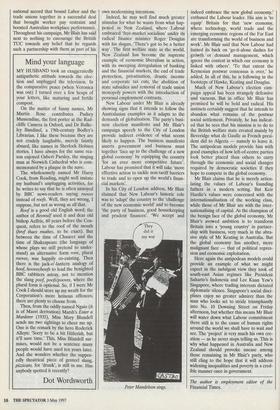Mind your language
MY HUSBAND took an exaggeratedly antipathetic attitude towards the elec- tion and unplugged the television. In the comparative peace (when Veronica was out) I turned over a few heaps of your letters, like maturing and fertile compost.
On the matter of funny names, Mr Martin Rose contributes Pudsey Mussendine, the first porter at the Rad- cliffe Camera in Oxford, and Dr Bulke- ley Bandinel, a 19th-century Bodley's Librarian. I like these because they are not crudely laughable, merely faintly absurd, like names in Sherlock Holmes stories. I have always for the same rea- son enjoyed Osbert Parsley, the singing man at Norwich Cathedral who is com- memorated by a plaque in the nave.
The wholesomely named Mr Harry Cook, from Reading, might well imitate my husband's unplugging activities, for he writes to say that he is often annoyed by BBC news-readers saying moves instead of roofs. Well, they are wrong, I suppose, but not as wrong as all that.
Roof is a good old English word; the author of Beowulf used it and dear old bishop Aelfric, 60 years before the Con- quest, refers to the roof of the mouth (hmf thaes muthes, to be exact). But between the time of Chaucer and the time of Shakespeare (the language of whose plays we still pretend to under- stand) an alternative form rove, plural moves, was happily co-existing. Then there is the jack-o'-lantern analogy of hoof, hooves/hoofs to lead the benighted BBC rabbiters astray, not to mention the slang poof, poofslpooves, where the plural form is optional. So, if I were Mr Cook I should store up my wrath for the Corporation's more heinous offences; there are plenty to choose from.
Then, from the oddly named Ngaio (it is of Maori derivation) Marsh's Enter a Murderer (1935), Miss Mary Blundell sends me two sightings to cheer me up. One is the remark by the hero Roderick Alleyn: 'Sorry to be a bit Hitlerish, but it'll save time."This, Miss Blundell sur- mises, would not be a sentence many people would have used ten years later. And she wonders whether the suppos- edly theatrical piece of genteel slang, pizzicato, for 'drunk', is still in use. Has anybody spotted it recently?
Dot Wordsworth


































































 Previous page
Previous page